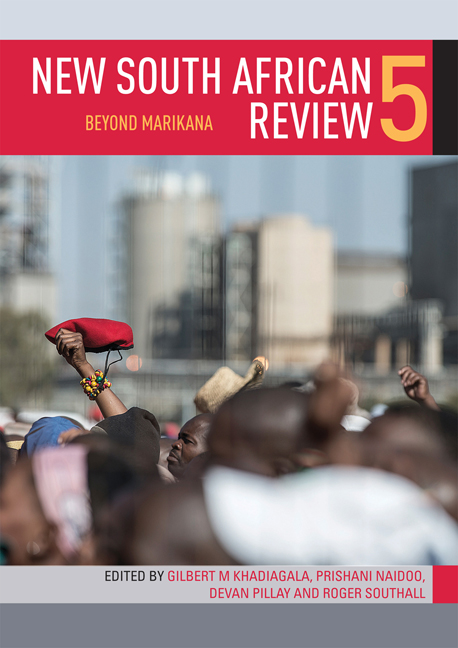Book contents
- Frontmatter
- Contents
- Preface
- Introduction: Political reconfigurations in the wake of Marikana
- PART 1 NEW POLITICAL DIRECTIONS?
- PART 2 ECONOMY, ECOLOGY AND LABOUR
- PART 3 STATE AND SOCIETY
- Introduction to Part 3
- Chapter 8 Constitutionalism: An ‘unqualified human good’?
- Chapter 9 People's Parliament? Do citizens influence South Africa's legislatures?
- Chapter 10 Corruption
- Chapter 11 Marikana and the politics of public order policing
- Chapter 12 ‘In December we are rich, in January we are poor’: Consumption, saving, stealing and insecurity in the kasi
- PART 4 SOUTH AFRICA IN THE INTERNATIONAL ARENA
- Contributors
- Index
Chapter 10 - Corruption
from PART 3 - STATE AND SOCIETY
Published online by Cambridge University Press: 21 April 2018
- Frontmatter
- Contents
- Preface
- Introduction: Political reconfigurations in the wake of Marikana
- PART 1 NEW POLITICAL DIRECTIONS?
- PART 2 ECONOMY, ECOLOGY AND LABOUR
- PART 3 STATE AND SOCIETY
- Introduction to Part 3
- Chapter 8 Constitutionalism: An ‘unqualified human good’?
- Chapter 9 People's Parliament? Do citizens influence South Africa's legislatures?
- Chapter 10 Corruption
- Chapter 11 Marikana and the politics of public order policing
- Chapter 12 ‘In December we are rich, in January we are poor’: Consumption, saving, stealing and insecurity in the kasi
- PART 4 SOUTH AFRICA IN THE INTERNATIONAL ARENA
- Contributors
- Index
Summary
I often say that when you can measure what you are speaking about, and express it in numbers, you know something about it; but when you cannot measure it, when you cannot express it in numbers, your knowledge is of a meagre and unsatisfactory kind …
INTRODUCTION
Analysing corruption is difficult and controversial. This is especially the case in contemporary South Africa where the morality of the anti-apartheid struggle has come to coexist with the practicalities and mechanics of governing. After being in power for twenty years, the African National Congress (ANC) finds itself having to confront the reality of corruption in government, the private sector and society.
The extent of corruption is moot. A common view is that corruption was less prevalent in the juvenile years of democracy and has become rampant now that the new dispensation is more mature. Versions of such a view emphasise personalities and leadership to a greater or lesser degree with, perhaps, the armament procurement scandal marking the transition of the former to the latter. Another, less popular, view suggests that politics and government require compromises and pragmatism and this has led to corruption taking root early on in South Africa's democratic journey.
These and other attempts to periodise or characterise corruption in South Africa share a common challenge: they require data to support the viewpoint that they propound. Furthermore, such categorisations become politicised – intentionally or unintentionally – as they interpolate party officials and government leaders. If corruption is worse now, then it is because of weaker leadership than that of previous administrations. If corruption was present at the birth of democracy, then the party in power and its leadership are perceived as culpable. Thus, any analysis of corruption is bound to fuel controversy. In an attempt to temper these obstacles, an effort is made in this chapter to problematise corruption, enabling a more nuanced approach to understanding its causes and consequences. This will entail a critical examination of the corruption data, allowing for a more nuanced assessment of whether corruption has or has not increased since the latter half of 2008. Part of the reason for this time baseline is the availability of systematic data from the Public Service Commission (PSC) and Special Investigative Unit (SIU).
- Type
- Chapter
- Information
- New South African Review 5Beyond Marikana, pp. 188 - 206Publisher: Wits University PressPrint publication year: 2015



